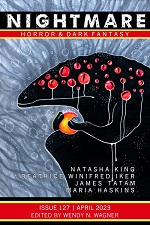“Root Canticle” by Natasha King
“Delicate Webbing” by Beatrice Winifred Iker
“Jumper” by James Tatam
Reviewed by Mihai Emmanuel
It seems that whenever summer arrives, a new opportunity for love and relationships are given birth as well. Consistent with human nature, attachment and care are close relatives—if not siblings, then surely cousins—with despair, loss, and volcanic, soul-shattering love. Coordinated with the final days of spring, Nightmare Magazine shares a trio of stories respecting the above themes. Following this motif, what are the chances that you might be visiting a place of tragedy, of a crime of such nature as to metamorphose the topos, to integrate you absolutely into the natural setting perverted by absolute evil?
Natasha King‘s “Root Canticle” is a story that deals, in deeply metaphorical and figurative language, with the themes of crime, regret—transformed into a warning to posterity—and the conversion of self into the very organic matter necessary to the absorption of a victim’s body.
The complex writing, which really demands attention, reveals, from the perspective of the narrator who confesses directly to us in the second person, how the place of evil takes on a personality, will, and character of its own.
A good read, beautifully structured and expressed, but one that requires a slow, careful and methodical approach in order for the vivid nature evoked by Ms. King to be fully appreciated.
The epigraph at the beginning of Beatrice Winifred Iker‘s story gives “Delicate Webbing” its autobiographical character from the start. The leitmotif of blood, of the fabric that unites two self-destructive natures and that concretizes a relationship based on a fulfilling bond through (self-) flagellation, is delicately expressed through poetic language.
My mother was a divorce lawyer and the attitude expressed in the story bears much resemblance to the Stockholm syndrome manifested by people caught in an emotional cycle that accepts suffering but also transfers it onto others, much like “the lies bandaging our bodies together in false intimacy.”
It is a short, metaphor-infused read which is recommended.
If this story appeals to you, you will like Max Blecher too, an author who dealt with the same themes, who also used a fetid setting and language reminiscent of sickly bodies. We end April with a slam (pun intended). At first glance, James Tatam‘s “Jumper” seems to subtly address the problem of suicide, the matter of those who are willing to give up everything by throwing themselves from a height high enough to maim them beyond recognition—a psychoanalysts dream. Well, technically it is suicide, in the sense that it is a voluntary giving up of life, but regarding the rest—you would be wrong. But suicide is accompanied by a teleology, a ‘why’, and if this ‘why’ gives us the logical conclusion that the act of jumping is considered a sport by some, then we are completely removed from the commonly understood meaning of the word suicide.
If one is an adrenaline junkie, say a race car driver, one might understand that there is a personal tragedy in the short duration of the experience, a desire of more, in spite of the risks. What if there is a sport, and an organization that offers complete anonymity, discretion and brotherhood (and sisterhood) for those who are willing to risk it all for the sake of utter enjoyment.
Similar to the noble death of a warrior confronting the ultimate adversary to the end, forfeiting your life for the sake of the art, for the way of dying, becomes slightly more understandable.
Milton Penrick wishes to perform the final jump in an artful way, but the interference of a suspicious trouble-causing outsider who defies the conventions of the organization complicates the jump ritual.
Milton understands that progress and improvement rarely come by living in the status quo or by accepting said conventions, even those within his extreme lifestyle.
The read is good, but it lacks emphasis on Milton’s artistic conviction and some characters don’t find their place in the narrative, particularly Abi with her husband.
Emmanuel Mihai finds the song ”I Will Lay Down My Bones Among the Rocks and Roots” fitting.
 Nightmare
Nightmare